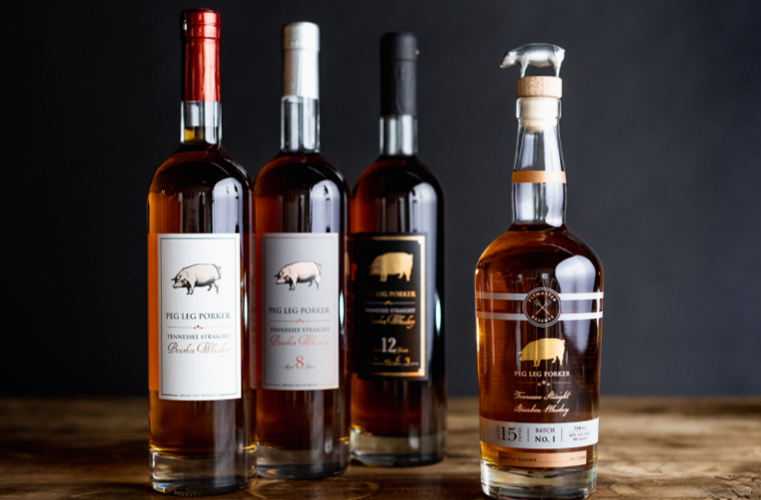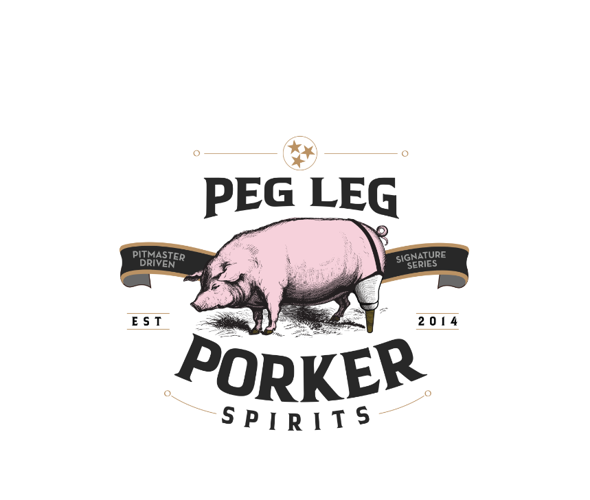
Peg Leg Porker Whiskey product line
Carey Bringle is a lot of things, but conventional is probably not an adjective often used to describe him. In the seven years since he launched his line of whiskeys under the Peg Leg Porker Spirits brand, he has released award-winning products and grown distribution to eight states and the U.K., with two more states ready to come online soon.
Bringle has accomplished this without distilling a single drop of his own spirits, without investors or backers and actually with zero employees dedicated to the company. “It’s just like with my restaurants,” he tells the Scene in a sit-down interview. “I believe in starting small, cheap and fast. First, you build up the customer base and the brand, then you can always go bigger and add more equipment. Most guys raise a lot of money and then build a distillery and wait for their whiskey to age. Then they go out and sell. If I’d spent millions of dollars, I wouldn’t have any money to buy the whiskey!”
Indeed, Bringle has created his brand by purchasing aged whiskey and using a contract blender and bottler to package his products. But now he's preparing to take that part of his business in-house with a new facility he's building out at 2700 Eugenia Ave. in Berry Hill. While he's had the building for two years as the home of his Peg Leg Porker Food Products operation distributing sauces and rubs, with the recent purchase of a $200,000 bottling line, he is ready to create a new public-facing arm of his PLP empire.
The first step was to acquire a DSP number, which stands for “distilled spirits plant.” A DSP designation is a grant from the government to “to produce, bottle, rectify, process or store beverage spirits” and is necessary to enter the production side of the industry. Distilleries are proud of the DSP numbers as a sign of how much history they have in the business. For Example, George Dickel is DSP TN-2 and Nelson’s Green Brier was delighted to be able to reclaim their family legacy of DSP TN-5 despite only restarting the business in the past decade.
Bringle’s DSP number under his Teal Hollow Distillery moniker is 21113, and he couldn’t be happier about it, no matter how many digits it has. Receiving that designation allows him to officially join the Tennessee Distillers Guild, and he hopes to rejoin the Tennessee Whiskey Trail, which he was an original member of when it was a private enterprise before it became a state program.

A big reason why Bringle chose to bring some of the production in-house is that he is no longer depending completely on purchased aged spirits. As the availability of these precious spirits has dried up over the past year, he has begun working directly with a contract distiller in the state to produce his own recipe, and has acquired thousands of barrels that are aging in warehouses in various Tennessee locations until they have matured and are ready to bottle.
“I’ve been buying new barrels for three years now, and those barrels will be ready soon,” he explains. “There just was no aged whiskey on the market, so I’ve been laying down 600 barrels a year. This has worked great for me, and the only reason I could build a distillery is because I was forced to because of growth.”
That would be a good problem to have, and Bringle admits he has plans to eventually purchase some land and build his own distillery, but not any time soon. The Eugenia facility will help fill the gap between business models by giving him more control of the process.

Peg Leg Porker's future production facility and tasting room on Eugenia Avenue
“It will be a blending and bottling facility with a tasting room and a bottle shop that will allow us to sell bottles at retail,” he says. “We’ll have a 2,500-gallon blending tank that should allow us to package 1,200 six-packs a day.” He’ll also put the whiskey through his special hickory charcoal filtration process at the facility, using coals from the smokers at his restaurant.
Another benefit to the facility is that Peg Leg Porker will be able to release special small-batch limited releases since he will have control over the scale of the packaging runs. It’s not cost-efficient to set up a contract bottling run to package a single barrel or a small batch of, say, the 8-year-old Tennessee rye whiskey he plans to release soon. But with his own staff doing the bottling, Bringle will be able to seek out unique spirits that are the kind of products that collectors and PLP fans may well line up down Eugenia to purchase.
Currently, Bringle's flagship white label four- to six-year aged Peg Leg Porker is the only product he has out in the market. “It’s a lot of people’s daily drinker,” he explains. “You have to have a flagship to sell through every day, and we’re hoping to be in all 50 states by the end of 2024.” He promises that his older whiskeys like the 8-year-old version of PLP will come back, and even his 12-year-old could potentially return. There will be future Pitmaster Reserve releases, and Bringle's intention was for them to change periodically after the initial 15-year-old smoke bomb of a bourbon. He’s currently experimenting with some older Canadian ryes, which would be a very interesting development for a Tennessee whiskey company.
Most of all, Bringle is excited about the future — the chance to combine the Peg Leg Porker philosophy of hospitality with his whiskey as he welcomes guests into his tasting room and the opportunity to morph his business into whatever he wants. “I’m really looking forward to the next chapter,” he says. “This will give me more flexibility and control. And we’ll definitely be scouting locations for a future large distillery.”
It looks like he finally might have to hire an employee or two, but Bringle welcomes the challenge.







